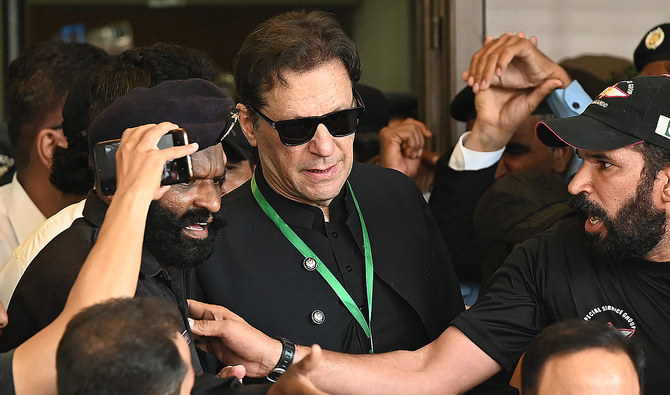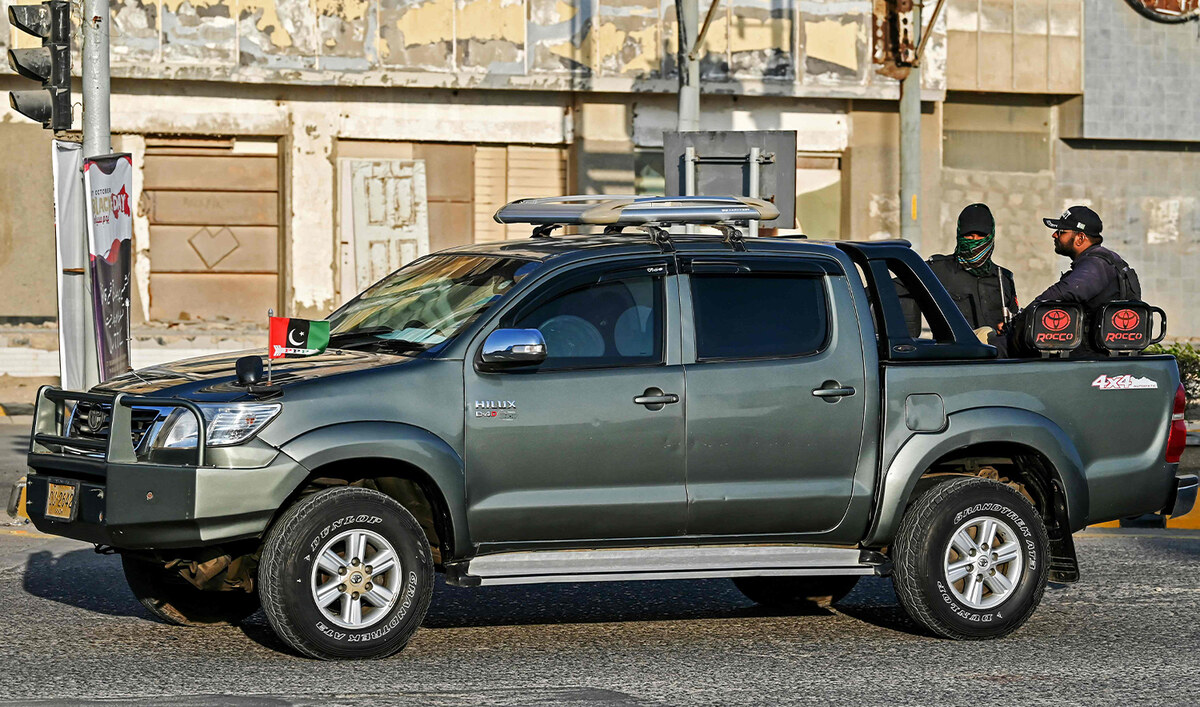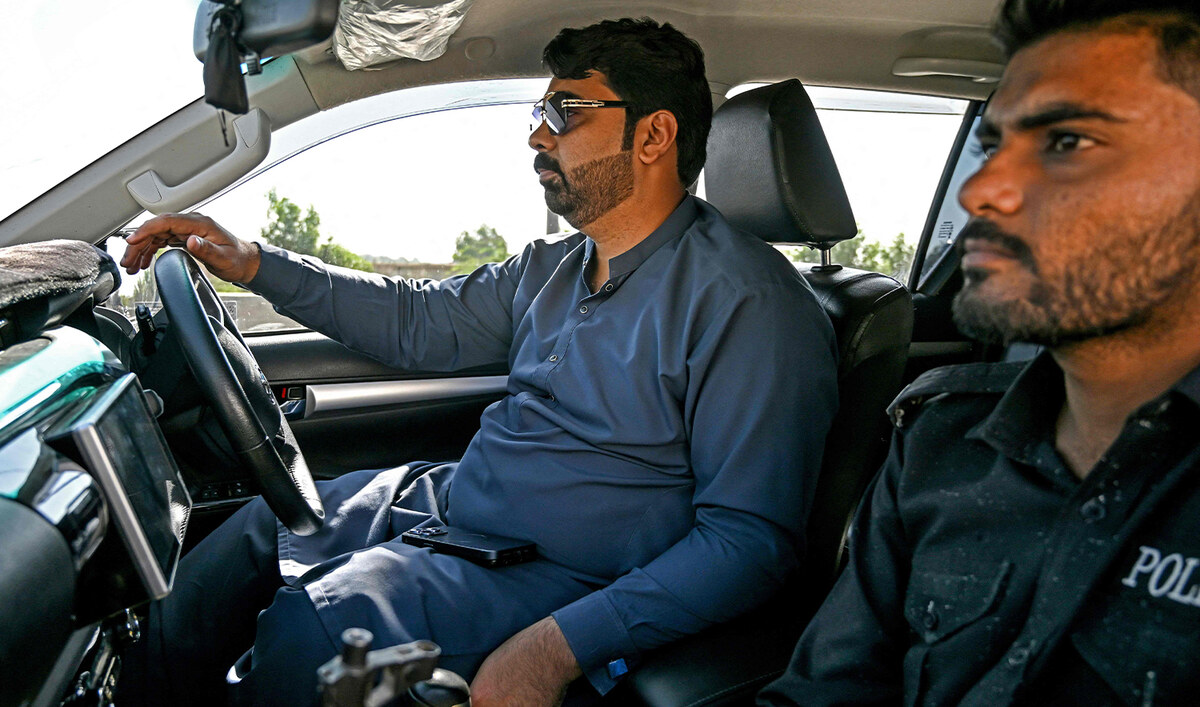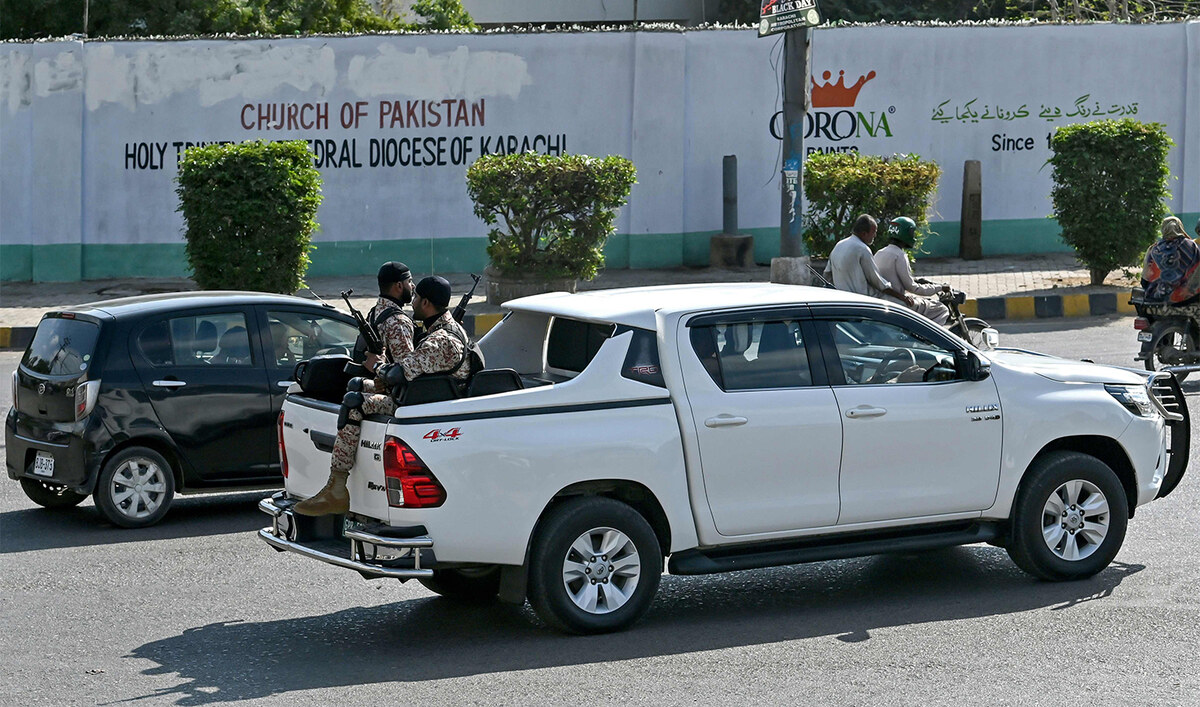ISLAMABAD: Pakistan’s jailed former prime minister, Imran Khan, said on Sunday it would be “foolish” not to have “excellent” relations with the army as he ruled out an out-of-court settlement for himself.
Ahead of Monday’s anniversary of his jailing last August on dozens of charges ranging from corruption to leaking state secrets, Khan said in written responses to Reuters questions that he held no grudges against the United States, whom he has in the past blamed for his 2022 ouster from office. Washington denies any role.
“Given Pakistan’s geographical position and the military’s significant role in the private sector, it would be foolish not to foster such a relationship [with the army],” Khan wrote in replies relayed by his media and legal team. “We are proud of our soldiers and armed forces.”
Khan said his criticisms against the army since his ouster had been directed at individuals, not the military as an institution:
“The miscalculations of the military leadership shouldn’t be held against the institution as a whole.”
On Wednesday, Khan offered to hold “conditional negotiations” with the South Asian nation’s military — if “clean and transparent” elections were held and the “bogus” cases against his supporters were dropped.
Pakistan’s army and government did not immediately respond to requests for comment on Khan’s remarks to Reuters. They have both repeatedly denied his assertions.
In his replies, the 71-year-old former cricket star did not specify what he wanted to discuss with the military.
‘OPEN TO ANY DIALOGUE’ WITH ARMY
The army, which has ruled Pakistan for nearly half its 76-year independent history, plays an oversized role in the politics and governance of the nation of 240 million people, though the current military leadership says it does not interfere in politics.
Khan, who lost power in a parliamentary vote of no confidence after falling out with the generals, has said the army has been backing what he calls the politically motivated cases against him, which the military vehemently denies.
Still, he said, there would be “no harm” in engaging with the generals if he should be released from jail and seek to return to power.
“We are open to any dialogue that could help improve the dire situation in Pakistan,” he said, adding that it was useless to open any such talks with the coalition government of Prime Minister Shehbaz Sharif, which he says does not enjoy public backing because he claims it won a “stolen” election in February. The election commission says polls were free and fair.
Rather, Khan said, it would be “more productive to engage with those who actually wield power.”
The military — which says Khan and his party were behind attacks on military installations on May 9 last year during widespread protests against his detention — has previously ruled out any talks with him.
Khan’s imprisonment has added to the political volatility in Pakistan, which has experienced a prolonged economic crisis and last month received a bailout from the International Monetary Fund.
The political instability since Khan’s ouster from power helped force Islamabad to accept the IMF’s painful fiscal consolidation requirements, which have burdened the people with heavy taxes, analysts say.
The IMF has called for political stability to help put the $350 billion economy on a recovery path.
Khan rejected the idea of reaching an out-of-court settlement with the government or military, unless they accepted that his PTI party had won a majority in February’s election.
“The elections were the most rigged in Pakistan’s history,” Khan told Reuters.
Jailed ex-PM Imran Khan says no out-of-court settlement in the offing
https://arab.news/5r8cj
Jailed ex-PM Imran Khan says no out-of-court settlement in the offing

- Khan says would be ‘foolish’ not to have good relations with army
- ‘Open to any dialogue’ with military but not government, Khan says
Pakistan plans to set up 35 special economic zones to facilitate businesses, industry

- Pakistani officials say over 200 B2B agreements reached with several Chinese companies, signed MoUs worth $70 million
- PM Shehbaz Sharif calls for accelerating work on regulatory reforms to provide a conducive environment for businesses
ISLAMABAD: Pakistan plans to establish 35 special economic zones (SEZs) to facilitate businesses and industry, officials said on Friday, amid Islamabad’s efforts to boost foreign investment.
The statement came at a meeting of Board of Investment (BOI) officials, presided over by Prime Minister Shehbaz Sharif, to review progress of various ongoing projects, according to Sharif’s office.
Officials briefed the prime minister that they had conducted a survey of the 35 SEZs under the Geographical Information System (GIS) and had extensive data to accelerate the progress of projects in these zones.
More than 200 business-to-business (B2B) agreements have been reached with several Chinese companies and memorandums of understanding (MoUs) worth $70 million have been signed, they added.
“Work on regulatory reforms should be accelerated to provide a conducive environment for business in the country,” Sharif was quoted as saying by his office.
“An effective and comprehensive roadmap should be created for the completion of B2B agreements with international investors and the implementation of signed memorandums of understanding.”
Pakistan, which has been facing an economic crisis, has been making attempts to boost foreign direct investment in a bid to support its $350 billion fragile economy, with Islamabad seeing a flurry of high-level exchanges with China, Saudi Arabia, Japan, Tajikistan, Azerbaijan, Qatar and other countries in recent months.
During the BOI meeting, PM Sharif instructed officials to set investment targets that could be achieved at the earliest.
“Effective marketing of investment opportunities in Pakistan is essential to attract foreign investors,” he said. “Construction of business facilitation centers, organization of road shows and other such measures are very important to bring foreign investment to the country.
Pakistan announces tariff cuts on imports under Azerbaijan trade deal

- Imports from Azerbaijan exempted from all kinds of customs and regulatory duties from Dec. 16
- Pakistan and Azerbaijan signed trade agreement in July during President Aliyev’s visit to Islamabad
KARACHI: Pakistan’s Federal Board of Revenue (FBR) has waived off customs and regulatory duties on imports from Azerbaijan under the Pakistan-Azerbaijan Preferential Trade Agreement, the finance ministry said in a notification this month.
During Azerbaijan President Ilham Aliyev’s two-day visit to Pakistan in July, both nations agreed to enhance the volume of bilateral trade to $2 billion, vowing to strengthen ties and increase cooperation in mutually beneficial economic projects. They also signed the Pakistan-Azerbaijan Preferential Trade Agreement to boost economic cooperation through the reduction of tariffs on goods like Pakistani sports equipment, leather, and pharmaceuticals as well as Azerbaijani oil and gas products.
“The federal government is pleased to exempt with effect from Dec. 16, 2024, the import into Pakistan from Azerbaijan of the goods specified,” the finance ministry said in a notification. adding that imports from Azerbaijan would be exempted from all kinds of tariffs including customs duty, additional customs duty and regulatory duty.
“Provided that where the rates of customs duty, additional customs duty, and regulatory duty [...] are higher than specified rates, the lower rates [...] shall apply,” it added.
The tariff concessions cover items including shelled hazelnuts or filberts, apricots, vegetable saps and extracts, non-stemmed tobacco, polyethylene, propylene copolymers, casing, tubing, drill pipes and refined copper wire with a maximum cross-sectional dimension exceeding 6 mm.
In recent weeks, there has been a flurry of visits, investment talks and economic activity between officials from Pakistan and the Central Asian nations as well as other transcontinental and landlocked countries like Azerbaijan as Islamabad seeks to consolidate the South Asian nation’s role as a pivotal trade and transit hub.
In latest challenge to army, Islamabad judge suspends order requiring vetting of TV news analysts

- Pakistan’s media regulator had instructed TV channels to seek army media wing’s approval before inviting retired officers as defense analysts
- Justice Babar Sattar is among six Islamabad judges who has accused army’s ISI spy agency of coercing them in ‘politically consequential’ cases
ISLAMABAD: Justice Babar Sattar of the Islamabad High Court (IHC) this week suspended an order by the Pakistan Electronic Media Regulatory Authority instructing TV channels to seek clearance from the military’s media wing before inviting retired military officers on current affairs programs as analysts.
Sattar was hearing a case challenging the much-debated April 2019 PEMRA notification, following which the Inter-Services Public Relations (ISPR) had released a list of 26 retired officers that it said were allowed to appear as defense analysts.PEM
“The Islamabad High Court has suspended a Pemra’s notification requiring defense analysts to obtain clearance from the ISPR before appearing on television programs,” Pakistan’s Dawn newspaper reported.
Most major Pakistani media outlets also reported on the development.
“Based on the presented arguments, the court suspended the notification, stating that it would remain ineffective until a final decision is announced in the case.”
The next hearing is scheduled for Feb. 11, 2025.
At a hearing of the case in September, Sattar had questioned the federal government on the military media wing’s “exclusive right” to decide who qualified to appear on TV as a defense analyst. The court also questioned why PEMRA had issued that notification in the first place and whether it had received a request from within the Pakistan army or ISPR.
PEMRA’s lawyer sought more time from the court to respond.
“Let PEMRA produce before the Court the original noting file on the basis of which the impugned notification was processed, recommended and issued to assist the Court as to why PEMRA felt the need to issue the said notification,” Justice Sattar wrote.
During that hearing, the court had asked PEMRA’s counsel about the watchdog’s authority to regulate the content of discussions on TV and issue directions for the pre-clearance of individuals by ISPR or others.
PEMRA’s lawyer pointed to Section 20-A of the PEMRA Ordinance, which relates to the obligation of licensees to uphold the sovereignty, integrity and security of Pakistan.
“When asked as to what does pre-clearance of individuals providing content on TV have to do with the sovereignty or security of Pakistan and how can PEMRA impose a prior restraint on speech, the learned counsel for PEMRA seeks further time to assist the Court,” the written order had read.
Pakistani journalist bodies and many journalists have long accused the government and the powerful military of censoring the press. Both deny allegations and insist they do not suppress the freedom of the press.
Sattar’s new order is not his first challenge to the army. He was among six Islamabad High Court judges who earlier this year wrote a letter to the Supreme Judicial Council watchdog and accused the military’s ISI spy agency of intimidating and coercing them over legal cases, particularly “politically consequential” ones.
The judges provided various examples of alleged interference, including a case concerning Pakistan’s imprisoned former prime minister Imran Khan. The letter also mentioned incidents where the judges said their relatives were abducted and tortured and their homes were secretly surveilled, aiming to coerce them into delivering favorable judgments in specific cases.
The army denies it interferes in political matters. It has so far refrained from commenting on the judges’ letter regarding the ISI’s alleged interference and intimidation.
Imposing ‘dala’ pickup trucks symbolize Pakistan’s power gulf

- Hilux has become a symbol of power, affluence and intimidation in a society marked by significant class divisions
- “Dala,” as it is locally known, also serves as euphemism for military intelligence agencies involved in covert operations
KARACHI: In Pakistan’s largest city, cars inch forward in bumper-to-bumper traffic. But some seamlessly carve through the jam: SUVs flanked by Toyota Hilux pickup trucks.
The Hilux has become a symbol of power, affluence and intimidation in a society marked by significant class divisions.
“The vehicle carries an image that suggests anyone escorted by one must be an important figure,” 40-year-old politician Usman Perhyar told AFP.
“It has everything — showiness, added security and enough space for several people to sit in the open cargo bed.”

On Karachi’s chaotic roads, Hiluxes part the traffic, speeding up behind cars and flashing their lights demanding drivers move out of their way.
The Hilux first became popular among feudal elites for its reliability in rural and mountain regions.
But in recent years, the “Dala,” as it is locally known, has soared in popularity as an escort vehicle among newly successful urban business owners.
Guards with faces wrapped in scarves and armed with AK-47s can be packed into the back of the truck, its windows blacked out.
“It is a status symbol. People have one or two pickups behind them,” said Fahad Nazir, a car dealer based in Karachi.

The Hilux debuted in 1968, but the model that became popular in Pakistan was the mid-2000s Hilux Vigo.
It was later upgraded and rebranded as the Revo, with prices ranging from 10 to 15 million rupees (approximately $36,000 to $54,000).
Their prices have remained steady and they retain excellent resale value in a market traditionally dominated by their manufacturer, Toyota.
“Amongst whatever luxury items we have, this is the fastest-selling item,” car seller Nazir told AFP.

Dealers say there was a spike in rentals during February’s national elections.
“I swear to God, you can’t run an election without a Revo,” said Sajjad Ali Soomro, a provincial parliamentarian from Imran Khan’s Pakistan Tehreek-e-Insaf (PTI) party.
In the eastern city of Gujrat, politician Ali Warraich — from the ruling Pakistan Muslim League-Nawaz party — finds it essential to travel with an escort of two of the trucks.
They allow him to navigate off-road terrain to attend dozens of weddings and funerals a month.
“Politics without this vehicle has become nearly impossible,” he tells AFP. Without one, he argues, potential supporters could question his influence and turn toward competitors.
“As a result, it has become a basic necessity,” he said.

The truck has also become a trademark in the suppression of dissenting voices, activists told AFP, with the word “Dala” serving as a euphemism for military intelligence agencies involved in covert operations.
The unmarked cars with plainclothes men inside were used extensively by authorities rounding up senior PTI leaders and officials in recent crackdowns — reinforcing the vehicle’s notorious reputation.
“Every time I see this vehicle on the road, I go through the same trauma I endured during my custody with agencies,” said one PTI member who was picked up earlier this year.
Former leader Khan was bundled into a black Dala by paramilitary soldiers when he was arrested in May 2023 in the capital Islamabad, a detention he blamed on the powerful military leadership.
He later accused political heavyweight and three-time prime minister Nawaz Sharif of trying to win the election “through Vigo Dala” — a swipe alleging the military was “carrying” his campaign.
Pakistani poet and activist Ahmad Farhad, known for criticizing the military’s involvement in politics, was taken away in a Hilux after a raid on his home in May by what he said were intelligence agencies.
“Sometimes, they park these vehicles around or behind my car, sending a clear message: ‘We are around’,” he told AFP. “A Dala aligns with their business of spreading fear, which they take great satisfaction in.”
In Karachi, a city rife with street crimes, the imposing Dala deters even outlaws.
“A typical mobile snatcher would opt for maybe looting a car as opposed to a truck,” said 35-year-old automobile enthusiast Zohaib Khan.
Increased street crime has led to more security checks by police, further slowing down movement across the city. But Hiluxes are immune.
Police “don’t typically stop me because they feel that I might be someone who might impact them in a bad way or harm them in some way or the other,” Khan said.
Pakistan confirms this year’s eighth case of mpox virus

- Latest case detected in 32-year-old man with a travel history outside Pakistan
- Mpox is mild but people with weak immune systems at higher risk of complications
KARACHI: Pakistan’s health ministry on Friday confirmed the country’s eighth case of the mpox virus this year in a patient who had recently returned from travels abroad.
People who contract mpox get flu-like symptoms and pus-filled lesions. Children, pregnant women and people with weakened immune systems are at higher risk of complications from the infection.
Pakistan confirmed its first mpox case in August and has since implemented screening protocols at all airports and border entry points.
“The 32-year-old patient has been isolated and treated,” Health Ministry spokesperson Sajid Shah told Arab News. “He is experiencing mild symptoms and is expected to recover soon.”
The spokesman added that the patient had recently returned from traveling in a Gulf country.
The World Health Organization in August declared a global health emergency over the spread of a new mutated strain of mpox named clade I, which first emerged in the Democratic Republic of Congo and has since spread to several countries, leading to increased monitoring and preventive measures worldwide.
Pakistan has so far not reported any cases of the new mutation.










